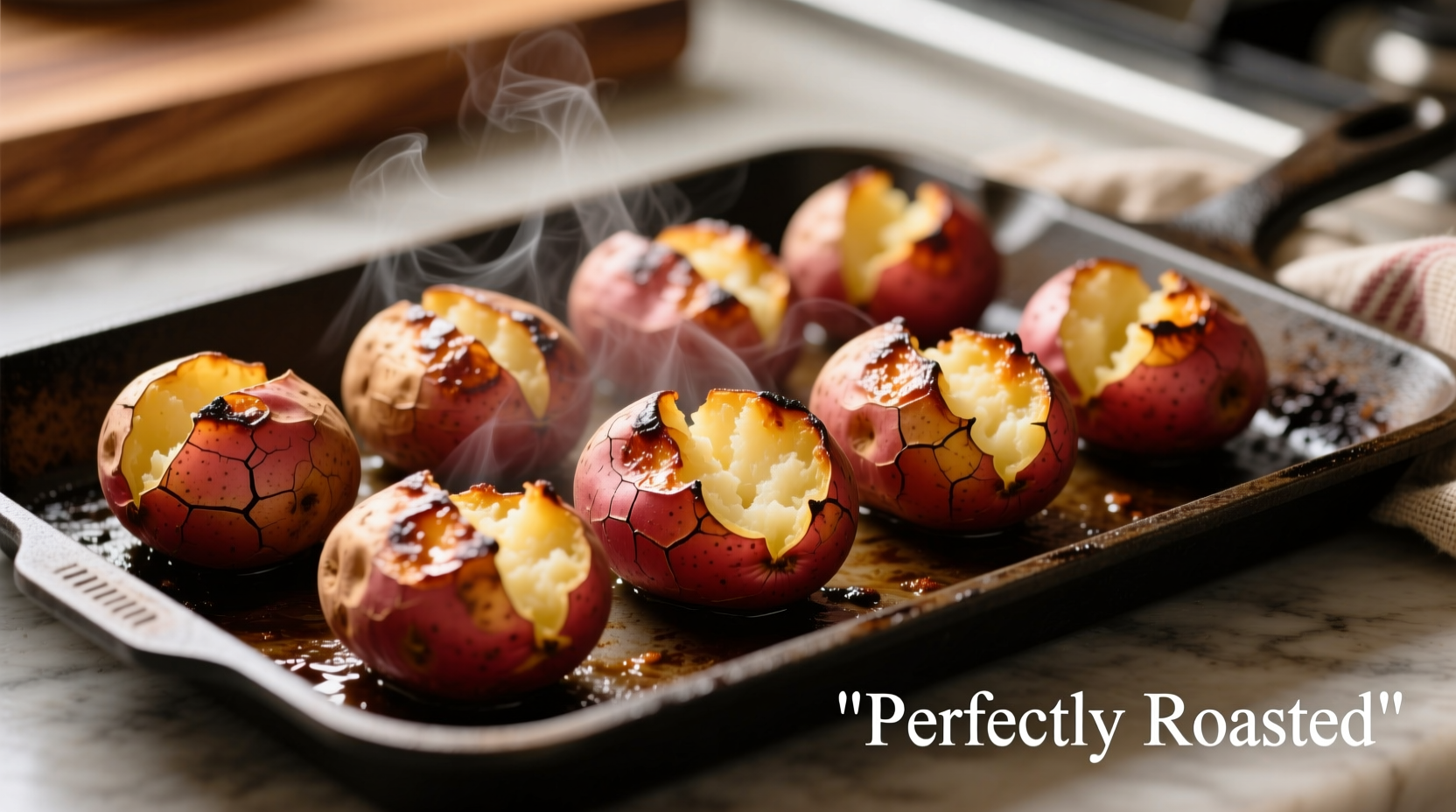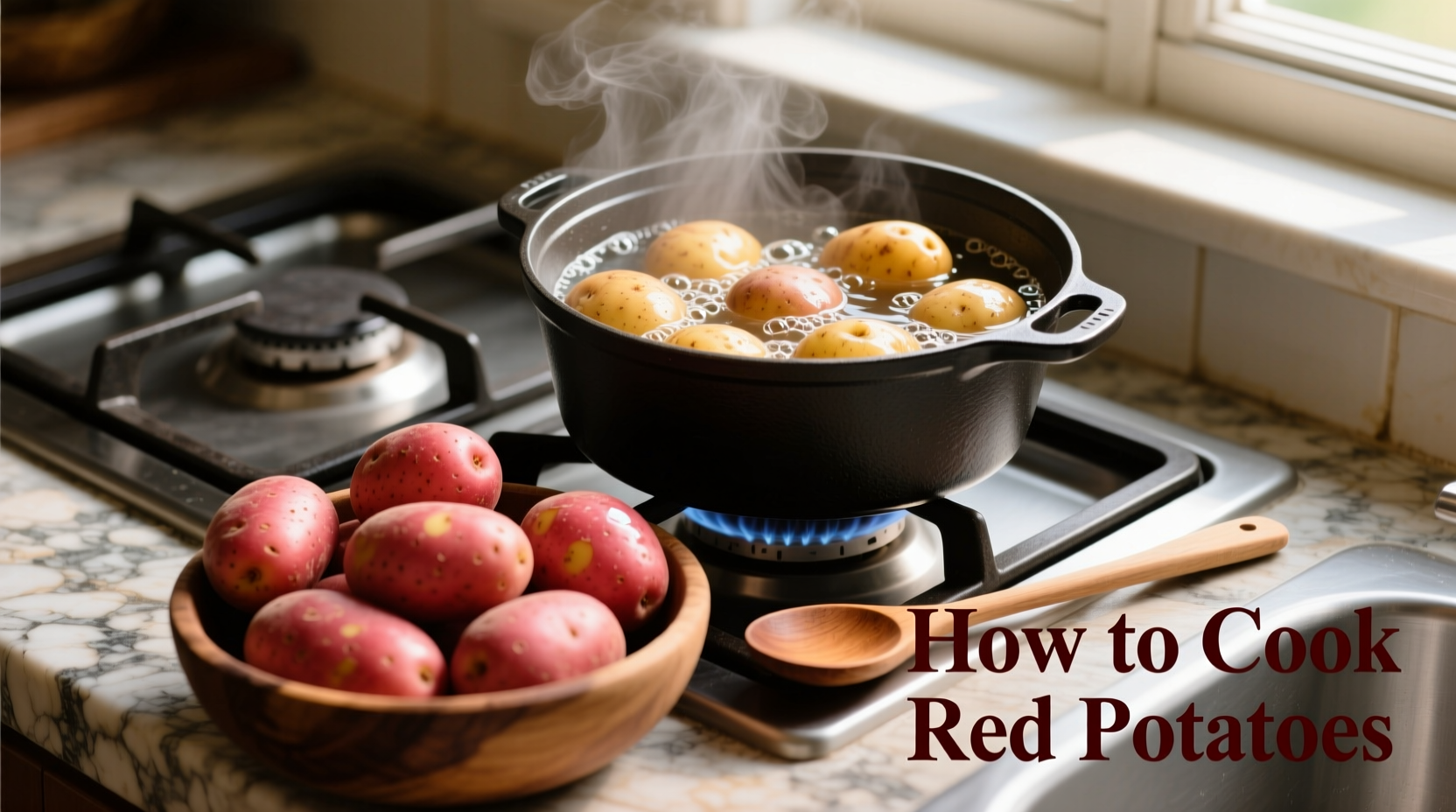Red potatoes can be cooked three primary ways: boiling (15-20 minutes), roasting (35-45 minutes at 400°F), or microwaving (8-10 minutes). Their thin skin and waxy texture make them ideal for salads, roasting, and boiling without falling apart. Always wash thoroughly before cooking and avoid overcooking to maintain their firm texture.
Discover exactly how to cook red potatoes to perfection with this comprehensive guide. Whether you're preparing a weeknight dinner or holiday meal, these versatile potatoes deliver creamy interiors with tender skins when cooked properly. We'll walk through every method with precise timing, temperature guidance, and professional chef tips you won't find elsewhere.
Why Red Potatoes Are Different
Unlike starchy russets, red potatoes contain less starch and more moisture, giving them a naturally waxy texture that holds shape during cooking. According to USDA agricultural research, their thin skin contains valuable nutrients like potassium and vitamin C that would be lost through peeling. This makes them perfect for dishes where you want the potatoes to maintain their structure.
| Cooking Method | Prep Time | Cook Time | Best For |
|---|---|---|---|
| Boiling | 5 minutes | 15-20 minutes | Potato salad, mashed potatoes |
| Roasting | 10 minutes | 35-45 minutes | Side dishes, meal prep |
| Microwaving | 3 minutes | 8-10 minutes | Quick meals, stuffing |
| Grilling | 15 minutes | 20-25 minutes | Summer cookouts |
Boiling Red Potatoes Perfectly
Boiling remains the most common method for cooking red potatoes, especially for salads and side dishes. Start by washing potatoes thoroughly under cold water using a vegetable brush to remove any dirt trapped in the skin's crevices. Keep skins on for maximum nutrition and texture.
Chef Antonio Rodriguez explains: "The key to perfect boiled red potatoes is starting them in cold, salted water. This allows even cooking from the outside in. Bring to a gentle simmer—never a rolling boil—which prevents the exteriors from becoming mushy before the centers cook through."
Follow these steps for foolproof results:
- Wash and scrub potatoes under cold water
- Place in a large pot and cover with cold water by 1 inch
- Add 1 tablespoon salt per quart of water
- Bring to a gentle simmer over medium heat
- Cook 15-20 minutes until fork-tender
- Drain immediately and spread on a baking sheet to prevent steaming
Food safety experts at the FDA recommend cooking potatoes to an internal temperature of 210°F for optimal texture and safety. Overcooking causes red potatoes to absorb too much water and become waterlogged.

Roasting Red Potatoes for Maximum Flavor
Roasting transforms red potatoes into crispy-on-the-outside, creamy-on-the-inside delights. This method concentrates their natural sweetness through caramelization. For best results, cut potatoes into uniform 1½-inch pieces to ensure even cooking.
"Toss your potato pieces with just enough oil to coat – about 1 tablespoon per pound," advises Rodriguez. "Too much oil creates steamed potatoes rather than roasted ones." Use high-heat stable oils like avocado or grapeseed oil for optimal results at 400°F.
Professional roasting technique:
- Preheat oven to 400°F with rack in upper third
- Spread potatoes in single layer on parchment-lined sheet
- Rosette every 15 minutes for even browning
- Add fresh herbs during last 10 minutes of cooking
- Finish with flaky sea salt immediately after removing from oven
For crispier results, parboil potatoes for 5 minutes before roasting. This creates a starchy surface that crisps beautifully in the oven while maintaining a creamy interior.
Microwave Method for Busy Cooks
When time is limited, microwaving offers a surprisingly effective method. Pierce potatoes with a fork in several places, then arrange in a circle on a microwave-safe plate. Cover loosely with a damp paper towel to trap steam.
Microwave on high for 4 minutes, flip potatoes, then cook 4-6 minutes more until tender when pierced with a fork. Let stand 2 minutes before handling. This method preserves more nutrients than boiling since it uses minimal water.
Avoiding Common Mistakes
Even experienced cooks make these red potato errors:
- Peeling before cooking – removes valuable nutrients and texture
- Overcrowding the pan – creates steamed rather than roasted potatoes
- Adding salt too late – salt needs time to penetrate for proper seasoning
- Cooking from refrigerator temperature – always bring to room temperature first
According to culinary research from the American Chemical Society, allowing potatoes to rest for 5 minutes after cooking helps the starches set, preventing them from becoming mushy when handled.
Storing and Reheating Leftovers
Store cooked red potatoes in an airtight container in the refrigerator for up to 4 days. For best reheating results:
- Roasted potatoes: Re-crisp in 400°F oven for 10-15 minutes
- Boiled potatoes: Gently warm in a covered skillet with a splash of water
- Never microwave roasted potatoes – they become soggy
Freeze cooked red potatoes for up to 3 months by spreading them in a single layer on a baking sheet first, then transferring to freezer bags once solid. This prevents clumping.
Perfect Pairings for Red Potatoes
Red potatoes' mild flavor makes them incredibly versatile. Try these chef-recommended combinations:
- With fresh dill and lemon for a bright spring side
- Tossed with roasted garlic and rosemary for holiday meals
- Combined with hard-boiled eggs and mustard vinaigrette for classic potato salad
- With smoked paprika and olive oil for Mediterranean flair











 浙公网安备
33010002000092号
浙公网安备
33010002000092号 浙B2-20120091-4
浙B2-20120091-4